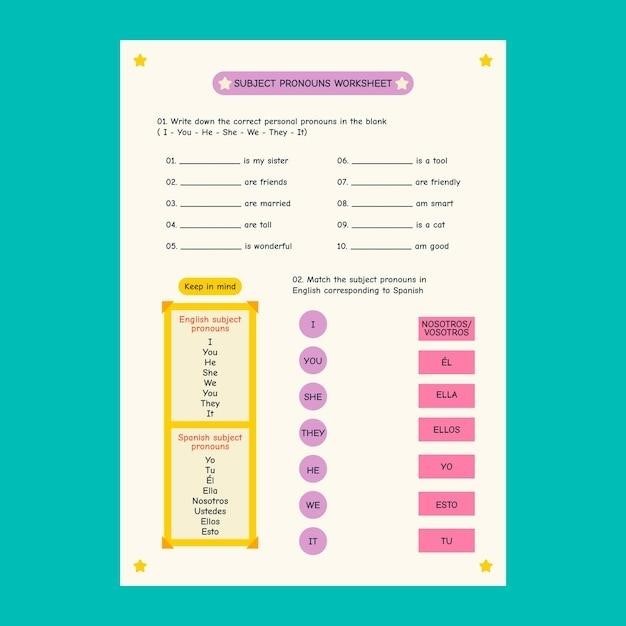CogAT Test for Kindergarten⁚ A Comprehensive Guide
The Cognitive Abilities Test (CogAT) is a nationally standardized multiple-choice test that is often used to identify students for gifted and talented programs. The test is divided by grade level, with the CogAT Level 5/6 being administered to kindergarteners. The most current version of the test, the CogAT Form 8, has three sections⁚ Verbal, Quantitative, and Nonverbal. The CogAT is a set of exams administered to children in grades K-12. The test is multiple-choice and is developed in a way to test a students academic aptitude. It reveals where a student stands in comparison to their peers.
Understanding the CogAT Test for Kindergarten
The CogAT Test for Kindergarten, also known as CogAT Level 5/6, is specifically designed to assess the cognitive abilities of children who are five and six years old. Unlike older students who take the CogAT, kindergarteners are not required to use bubble sheets to record their answers. This test is a crucial tool for identifying potential gifted students and serves as a valuable guide for educators in understanding a child’s cognitive strengths and weaknesses.
The CogAT measures a child’s reasoning abilities in three primary areas⁚ Verbal, Quantitative, and Nonverbal. The Verbal Battery evaluates a child’s vocabulary, comprehension of ideas, verbal memory, and ability to discover word relationships. The Quantitative Battery assesses a child’s quantitative reasoning and problem-solving skills, focusing on their ability to organize and provide context to numerical and mathematical symbols. Lastly, the Nonverbal Battery tests a child’s ability to organize geometric shapes and figures, requiring them to demonstrate their understanding of context by inventing strategies for solving novel problems.
The CogAT Kindergarten Test is a valuable tool for identifying gifted students, providing educators with insights into a child’s cognitive development. It helps educators tailor their teaching approaches to meet the unique needs of each student and ensures that gifted children receive the support they need to thrive in their academic journey.
Purpose of the CogAT Test
The CogAT Test for Kindergarten serves a multifaceted purpose in the educational landscape. It plays a critical role in identifying students who demonstrate exceptional cognitive abilities, potentially qualifying them for placement in gifted and talented programs. By assessing a child’s reasoning skills across verbal, quantitative, and nonverbal domains, the CogAT provides educators with valuable insights into their cognitive development and learning potential.
The test’s results offer a comprehensive view of a child’s strengths and weaknesses, enabling educators to tailor their instruction to meet their unique needs. Moreover, the CogAT can serve as a valuable tool for monitoring a child’s cognitive growth over time, helping educators track their progress and adjust their teaching strategies accordingly. It provides a standardized measure of cognitive abilities, allowing educators to compare a child’s performance to their peers and identify those who may require additional support or enrichment opportunities.
In essence, the CogAT Test for Kindergarten is a powerful tool that empowers educators to identify gifted students, tailor instruction, and foster a personalized learning environment that nurtures the unique talents and potential of each child. Its primary purpose is to provide a comprehensive understanding of a child’s cognitive abilities, guiding educators in their efforts to ensure that every student has the opportunity to reach their full academic potential.
CogAT Test Format for Kindergarten
The CogAT Test for Kindergarten is designed to be engaging and age-appropriate, taking into consideration the developmental stage of young learners. The test format is tailored to their cognitive abilities and attention spans, ensuring a positive and productive testing experience. The Kindergarten CogAT test typically includes a total of 118 questions, covering three distinct batteries⁚ Verbal, Quantitative, and Nonverbal.
Unlike older students who use bubble sheets to record their answers, Kindergarteners are provided with a different approach. Instead of traditional bubble sheets, they engage in a more interactive format where they directly point to or mark their answers. This approach is designed to be more accessible and engaging for younger children, making the test experience less intimidating and more enjoyable.
The CogAT Test for Kindergarten is administered by trained educators or test administrators who are familiar with the specific requirements and procedures. The test is typically administered in a quiet and comfortable setting, ensuring that the children feel relaxed and focused. The test format is designed to assess a child’s reasoning abilities in a way that is both engaging and informative, providing valuable insights into their cognitive development and learning potential.
CogAT Test Batteries
The CogAT Test for Kindergarten is structured around three distinct batteries, each designed to assess different aspects of a child’s cognitive abilities. These batteries are the foundation of the CogAT evaluation, providing a comprehensive picture of a child’s reasoning skills and their potential for academic success.
The Verbal Battery is focused on a child’s understanding and use of language. It assesses their vocabulary, comprehension, and ability to identify relationships between words. This battery is crucial for evaluating a child’s verbal reasoning skills, which are fundamental for reading comprehension, writing, and communication.
The Quantitative Battery assesses a child’s ability to reason with numbers and mathematical concepts. It evaluates their understanding of numerical relationships, patterns, and problem-solving strategies. This battery is important for assessing a child’s early mathematical skills and their potential for success in STEM subjects.
Verbal Battery
The Verbal Battery within the CogAT for Kindergarten is designed to evaluate a child’s understanding and use of language. It is a crucial component of the overall assessment, as it provides insights into a child’s verbal reasoning skills, which are fundamental for academic success. The questions in the Verbal Battery are carefully crafted to assess various aspects of a child’s linguistic abilities, including their vocabulary, comprehension, and ability to identify relationships between words;
This battery typically includes questions that require children to complete sentences, identify synonyms or antonyms, or understand the meaning of words within a specific context. The tasks are designed to be engaging and age-appropriate, ensuring that children can demonstrate their understanding of language in a fun and interactive way. The Verbal Battery is a critical element in the CogAT, providing valuable information about a child’s verbal reasoning skills, which are essential for reading comprehension, writing, and overall communication abilities.
Quantitative Battery
The Quantitative Battery within the CogAT for Kindergarten focuses on assessing a child’s understanding of numbers and their ability to solve problems using numerical reasoning. This battery plays a vital role in evaluating a child’s mathematical aptitude, which is a crucial foundation for future academic success in STEM fields. The questions in the Quantitative Battery are carefully designed to measure a child’s grasp of basic mathematical concepts, including counting, number recognition, and simple arithmetic.
The tasks may involve identifying patterns in sequences of numbers, comparing quantities, or solving simple addition and subtraction problems. The questions are presented in a way that is engaging and age-appropriate, ensuring that children can demonstrate their understanding of numerical concepts in a fun and interactive way. The Quantitative Battery within the CogAT for Kindergarten provides valuable information about a child’s early mathematical skills, which are essential for future success in mathematics and related fields.
Nonverbal Battery
The Nonverbal Battery of the CogAT for Kindergarten is designed to assess a child’s visual reasoning and spatial abilities. This battery goes beyond traditional language-based assessments, providing insights into a child’s capacity to understand and manipulate visual information. The questions within this battery typically involve tasks such as recognizing patterns in geometric shapes, identifying missing parts in incomplete figures, or understanding spatial relationships. These tasks require children to think critically and apply their visual reasoning skills to solve problems.
The Nonverbal Battery is particularly important for Kindergarteners because it helps to identify children who may excel in areas beyond traditional language-based learning. It also provides valuable information about a child’s potential for success in subjects such as art, design, and architecture. The results from this battery can help educators tailor their instruction to meet the unique learning styles and strengths of each individual child, fostering a more inclusive and enriching learning environment.
Preparing for the CogAT Test
Preparing for the CogAT Test for Kindergarten doesn’t have to be a stressful experience. It’s all about creating a fun and engaging learning environment for your child. The key is to introduce them to the types of questions they might encounter on the test in a way that feels like play. You can start by incorporating activities into their daily routine that focus on visual reasoning, problem-solving, and basic math concepts. For example, you can play games like “I Spy” to enhance visual observation, build puzzles to promote spatial reasoning, or use blocks to explore simple geometric shapes.
Remember, the goal is to make learning enjoyable and build confidence in your child’s abilities. Don’t put pressure on them to perform perfectly, and focus on the process of learning rather than the outcome. A relaxed and positive approach will help your child feel confident and prepared on test day. The CogAT Test is just one piece of the puzzle when it comes to assessing a child’s potential, and it’s important to remember that every child learns and develops at their own pace.
Tips for Successful Test Preparation
Preparing for the CogAT test for kindergarten doesn’t have to be a daunting task. With a little planning and a playful approach, you can help your child feel confident and ready for the test. Start by creating a fun learning environment that focuses on building foundational skills. Engage them in activities that encourage visual reasoning, problem-solving, and basic math concepts. For example, play games like “I Spy” to enhance visual observation, build puzzles to promote spatial reasoning, or use blocks to explore simple geometric shapes.
Remember, the key is to make learning enjoyable. Don’t pressure your child to perform perfectly, and focus on the process of learning rather than the outcome. A relaxed and positive approach will help your child feel confident and prepared on test day. The CogAT test is just one piece of the puzzle when it comes to assessing a child’s potential, and it’s important to remember that every child learns and develops at their own pace.
Free CogAT Practice Tests
Finding free CogAT practice tests for kindergarten can be a valuable resource for parents and educators. These tests offer a chance for children to familiarize themselves with the format, question types, and overall experience of the actual CogAT exam. Many websites and educational platforms provide free CogAT practice tests specifically designed for kindergarteners. These tests often include a mix of verbal, quantitative, and nonverbal questions, mirroring the structure of the real exam.
By exposing your child to these practice tests, you can help them develop confidence and build familiarity with the test’s structure. It’s important to remember that these free tests are just a starting point. They can help your child get a feel for the test, but they don’t replace the value of comprehensive preparation and development of foundational skills. Remember to approach these practice tests in a fun and engaging way, focusing on the learning experience rather than just the score.
Recommended CogAT Prep Resources
Preparing for the CogAT test for kindergarten doesn’t have to be overwhelming. There are numerous resources available to help your child develop the necessary skills and confidence. Beyond free practice tests, consider exploring other options for comprehensive preparation. Look for CogAT prep materials specifically designed for kindergarteners, as these resources will be tailored to their developmental level and learning style.
Some popular CogAT prep resources include workbooks, online courses, and mobile apps. These materials often provide a structured approach to learning, covering a range of topics including verbal reasoning, quantitative reasoning, and nonverbal reasoning. They may also include strategies for test-taking, tips for managing time effectively, and practice questions that simulate the actual CogAT exam. When choosing CogAT prep resources, make sure they align with your child’s learning style and interests. Remember, the goal is to create an enjoyable and engaging learning experience that helps your child build the skills needed for success.
Importance of Practice Tests
Practice tests play a crucial role in preparing your child for the CogAT test, particularly for kindergarteners. These tests offer a valuable opportunity to familiarize your child with the format, question types, and pacing of the actual exam. By working through practice questions, your child gains a better understanding of the skills being assessed and develops strategies for approaching different problem-solving scenarios. Practice tests also help build confidence and reduce test anxiety.
As your child becomes more comfortable with the test format, they can focus on developing their cognitive abilities. Additionally, practice tests allow you to identify areas where your child may need additional support. By analyzing their performance on practice tests, you can pinpoint specific skills that need further development. This allows you to tailor your preparation efforts to address individual needs and optimize your child’s chances of success on the CogAT exam. Remember, consistent practice with appropriate materials can significantly enhance your child’s readiness and confidence on test day.
CogAT Test Day Tips
Test day can be a nerve-wracking experience for any child, especially a kindergartener. To help your child feel prepared and confident, here are some essential tips for the CogAT test day⁚

First, ensure your child gets a good night’s sleep the night before the test. A well-rested child will be more alert and focused. On test day, provide a nutritious breakfast to fuel their brain. Avoid sugary snacks or drinks that can cause energy crashes.
Secondly, arrive at the testing location early to avoid any last-minute stress. Allow time for your child to use the restroom and settle in. Bring a comfort item, such as a favorite toy or book, to help your child feel relaxed.
Finally, remind your child that the CogAT is simply a test, and it’s okay to not know all the answers. Encourage them to take their time, read the questions carefully, and try their best. Most importantly, let them know that you’re proud of them no matter the outcome.



